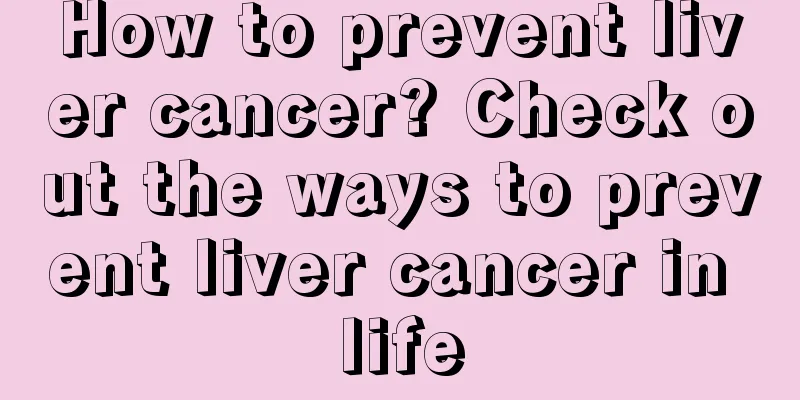What are the functions of the liver?

|
The liver is an important organ in the human body, and it has many functions. It can help us regulate the body's metabolism, promote bile production and excretion, and has good detoxification and coagulation functions. 1. Metabolic function: ① Sugar metabolism: Starch and sugar in the diet are digested and converted into glucose and absorbed through the intestines. The liver synthesizes it into glycogen and stores it. When the body needs it, liver cells can break down glycogen into glucose for the body to use. ② Protein metabolism: The liver is the only organ that synthesizes albumin in the human body. The liver is involved in the production, maintenance and regulation of globulins other than gamma globulins, enzyme proteins and plasma proteins. Amino acid metabolism such as deamination reactions, urea synthesis and ammonia processing are all carried out in the liver. ③Fat metabolism: the synthesis and release of fat, the decomposition of fatty acids, the production and oxidation of ketone bodies, the synthesis of cholesterol and phospholipids, the synthesis and transport of lipoproteins, etc. all take place in the liver. ④ Vitamin metabolism: The synthesis and storage of many vitamins such as A, B, C, D and K are closely related to the liver. Abnormal vitamin metabolism occurs when the liver is significantly damaged. ⑤ Hormone metabolism: The liver is involved in the inactivation of hormones. When liver function is damaged for a long time, sex hormone imbalance may occur. 2. Bile production and excretion: The uptake, conjugation and excretion of bilirubin, and the production and excretion of bile acids are all undertaken by the liver. The bile produced and secreted by liver cells is transported to the gallbladder through the bile duct. After being concentrated by the gallbladder, it is discharged into the small intestine to help the digestion and absorption of fat. 3. Detoxification effect: Some harmful wastes produced during the human body's metabolism and the metabolism and decomposition products of foreign poisons, toxins, and drugs are detoxified in the liver. 4. Immune function: The liver is the largest reticuloendothelial cell phagocytic system, which can phagocytize, isolate and eliminate various invading and endogenous antigens. 5. Coagulation function: Almost all coagulation factors are produced by the liver. The liver plays an important regulatory role in the dynamic balance of the human body's coagulation and anticoagulation systems. The severity of liver damage is often parallel to the degree of coagulation disorder. Clinically, it is common for some patients with cirrhosis to suffer bleeding or even death due to liver failure. 6. Others: The liver is involved in the regulation of blood volume, heat generation, and water and electrolyte regulation. When the liver is damaged, the regulation of electrolytes such as sodium, potassium, iron, and phosphorus becomes unbalanced. A common symptom is that water and sodium are retained in the body, causing edema, ascites, etc. |
<<: What are the symptoms of aplastic anemia?
>>: What is the difference between deafness and tinnitus?
Recommend
What to do if the toothpick breaks in the card slot
More and more people are using mobile phones now,...
How long after double eyelid surgery can I drink alcohol?
Double eyelids are a more popular eye shape becau...
Why do you feel dizzy during exercise? Scientific exercise is the key
People are increasingly aware that exercise is go...
What is a normal heart rate after exercise
The heart is the engine of the human body. If we ...
What is the best way to treat primary liver cancer? Three aspects of liver transplantation for treating primary liver cancer
Liver cancer is not scary, the key lies in clever...
How to help digestion
Whether it can be digested normally is the bigges...
What to do if you have a sore throat after chemotherapy
For patients with different types of cancer, alth...
How to treat advanced kidney cancer?
How to treat late-stage kidney cancer? The main t...
How to quickly expel kidney stones
I believe many people are familiar with the disea...
Spread and metastasis of lung cancer
The growth rate, spread and metastasis of lung ca...
What to do if you feel dizzy after sleeping for too long
Sleeping conditions have a great impact on people...
Several diets suitable for fibroids
Breast fibroma is a benign tumor composed of a mi...
Can breast cancer patients reconstruct after mastectomy?
Breast cancer patients can undergo reconstruction...
What are the early symptoms of lung cancer? Several symptoms of early lung cancer
After getting lung cancer, the earlier the diseas...
What is the reason for the decline of memory in teenagers
Many people think that only middle-aged and elder...









